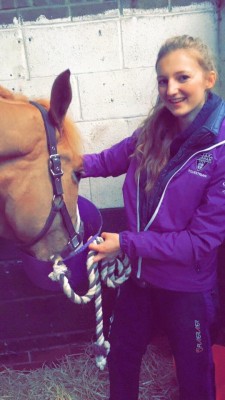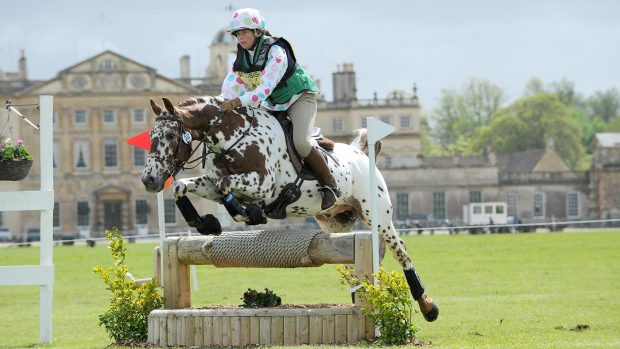By Isabelle O’Bryen
As one of the newest members of the Durham University Equestrian team (DUET), only joining in October, it’s been quite a busy few months learning the ropes of BUCS equestrian.
When I signed up for the team trials I didn’t expect what was coming; I never saw polishing my riding boots being a part of my weekly routine at Durham University. This is mainly because with 84 applicants for 14 spaces I never thought I’d actually get onto the team!
Two months later I sit here with my hot chocolate listening to the rain fall on the window, putting off writing an essay, wondering how I’ve managed to fall back into this fantastically crazy world of horsey people. There aren’t many people you meet at university that share so many of the same unique childhood experiences, which is part of what makes the team so special.
Having trained with the team for a couple of months now, I’ve come to realise that the  differences between training your own horse at home and training for BUCS (British Universities and Colleges Sport) competitions is huge.
differences between training your own horse at home and training for BUCS (British Universities and Colleges Sport) competitions is huge.
For a start, everything except the clothes on your back and the team standing beside you changes every time you ride. Each week at training, I ride a different horse in a different discipline — it’s a unique experience.
Likewise, each competition is at a different yard, and in a different city. All you can familiarise yourself with is the format of the competition and learn to adapt to each situation in the limited time that you have.
My very first competition took place a few weeks ago in York. We arrived in our team kit, kindly sponsored by Cordings of Piccadilly, feeling very smart and very proud to be representing Durham University. Thankfully, the other three members of my team (Rollo Uloth, Sophie Hall and Jade Watt) have been competing for DUET for years, so they made sure I knew what was going on throughout the day and kept me centred.
It very quickly became apparent that the second you take the draw to find out what horse you’re on for each discipline is the second you start planning how you’re going to get the best out of your horse. You are given a short description (mine read “14.2hh cob, 5-year-old skewbald gelding”) and a short demonstration of the horse or pony being ridden and then it’s your turn.
My aim was not to do anything spectacular, I just wanted to have a good, consistent and correct dressage test.
I was third to ride on the pony I had drawn, and when it came to my turn he was tired from the excitement of the competition, both physically and mentally. All of the different riders doing different things was a lot to take in for a young horse. The warm-up didn’t go as I had expected, and it soon became clear that this was going to be a lot harder than I had initially thought.
The toughest part is using your limited warm-up time wisely; five minutes to figure out how to get the best out of a strange horse feels like two seconds if it’s not going well. On the other hand, it can feel like a lifetime if you and the horse click. Another difficulty is clearing the idea in your head of how the horse goes with another rider, which clouds your judgement of how the horse actually feels to you and how well it’s responding to your aids in the moment. But at the same time, you’ve got to watch those going before you to get as many clues about the horse as possible. It’s hard to clear all these expectations and focus on getting a connection with the horse.
I rode the test praying that the pony would do what I wanted it to but sadly it wasn’t perfect. When I finished the dressage I just hoped that my score wouldn’t bring down our team too much. Annoyed and frustrated, I went on to the second phase of the competition; the showjumping, in the hope of redeeming myself.
Thankfully this went significantly better. I was on a lovely ex-hunter who took every jump (literally) in his stride. The 16.2hh barely had to pick his legs up and really knew his job.
I concentrated on keeping a rhythm through the course of jumps and keeping the canter active and powerful. There were parts of my round that I would do differently if I had another chance but I finished happy. The contrast between the rounds really showed the unpredictability of BUCS competitions.
At the end of the day, the results revealed that team Durham had won.
I wasn’t sure whether to be ecstatic or relieved — probably somewhere in the middle. Although I would have liked to have done better individually, I was so happy that we won as a team.
On busy days like these competitions, teamwork is vital. We were lucky to have another of our squad members, Rosalie, with us to help us warm up. The kind, encouraging words from the team before you ride are the difference between being calm and relaxed or panicking. When you slow it down you can think clearly and focus, instead of stressing and falling back into bad habits, which for me is playing too much with my hands.
Riding a different horse each time highlights any and all of your bad habits and weaknesses, bringing you back to the basics of using your aids effectively and focusing on the scales of training.
From this first competition, I can certainly say that it’s a lot harder than it looks, and there is so much more to think about. You take for granted how easy it is to ride a horse you know and how naturally you can anticipate what they are going to do. For developing my riding, this is such a valuable experience.
I’ve got a lot to learn, but there’s time for improvement in the coming months of training. Hopes are high for the rest of the season and there’s no knowing where we’ll end up in the BUCS equestrian league, but I have no doubt we’ll have a lot of fun along the way.
Isabelle




